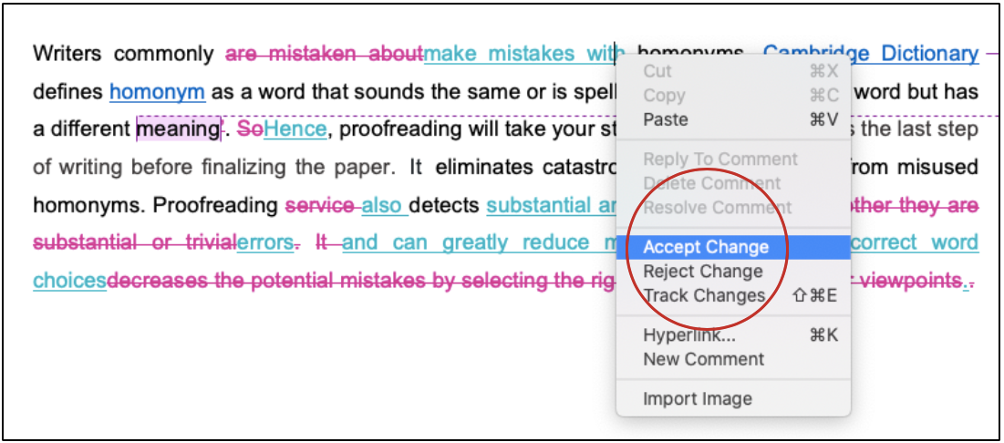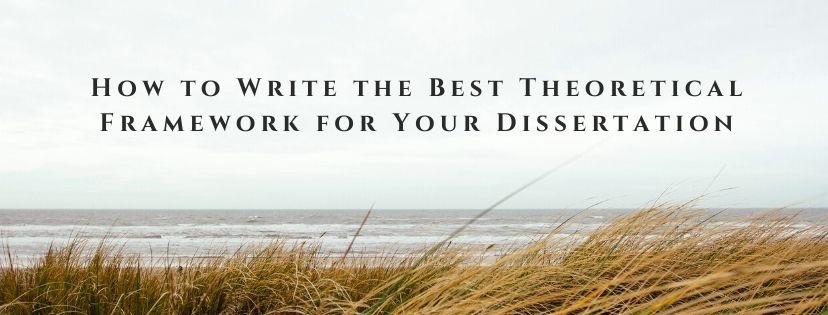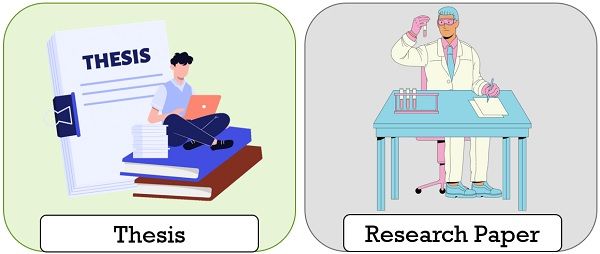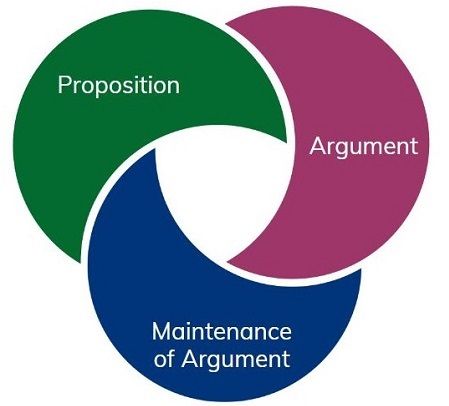[email protected]
- English English Spanish German French Turkish


Thesis vs. Research Paper: Know the Differences
It is not uncommon for individuals, academic and nonacademic to use “thesis” and “research paper” interchangeably. However, while the thesis vs. research paper puzzle might seem amusing to some, for graduate, postgraduate and doctoral students, knowing the differences between the two is crucial. Not only does a clear demarcation of the two terms help you acquire a precise approach toward writing each of them, but it also helps you keep in mind the subtle nuances that go into creating the two documents. This brief guide discusses the main difference between a thesis and a research paper.

This article discusses the main difference between a thesis and a research paper. To give you an opportunity to practice proofreading, we have left a few spelling, punctuation, or grammatical errors in the text. See if you can spot them! If you spot the errors correctly, you will be entitled to a 10% discount.
It is not uncommon for individuals, academic and nonacademic to use “thesis” and “research paper” interchangeably. After all, both terms share the same domain, academic writing . Moreover, characteristics like the writing style, tone, and structure of a thesis and research paper are also homogenous to a certain degree. Hence, it is not surprising that many people mistake one for the other.
However, while the thesis vs. research paper puzzle might seem amusing to some, for graduate, postgraduate and doctoral students, knowing the differences between the two is crucial. Not only does a clear demarcation of the two terms help you acquire a precise approach toward writing each of them, but it also helps you keep in mind the subtle nuances that go into creating the two documents.
Defining the two terms: thesis vs. research paper
The first step to discerning between a thesis and research paper is to know what they signify.
Thesis: A thesis or a dissertation is an academic document that a candidate writes to acquire a university degree or similar qualification. Students typically submit a thesis at the end of their final academic term. It generally consists of putting forward an argument and backing it up with individual research and existing data.
How to Write a Perfect Ph.D. Thesis
How to Choose a Thesis or Dissertation Topic: 6 Tips
5 Common Mistakes When Writing a Thesis or Dissertation
How to Structure a Dissertation: A Brief Guide
A Step-by-Step Guide on Writing and Structuring Your Dissertation
Research Paper: A research paper is also an academic document, albeit shorter compared to a thesis. It consists of conducting independent and extensive research on a topic and compiling the data in a structured and comprehensible form. A research paper demonstrates a student's academic prowess in their field of study along with strong analytical skills.
7 Tips to Write an Effective Research Paper
7 Steps to Publishing in a Scientific Journal
Publishing Articles in Peer-Reviewed Journals: A Comprehensive Guide
10 Free Online Journal and Research Databases for Researchers
How to Formulate Research Questions
Now that we have a fundamental understanding of a thesis and a research paper, it is time to dig deeper. To the untrained eye, a research paper and a thesis might seem similar. However, there are some differences, concrete and subtle, that set the two apart.
1. Writing objectives
The objective behind writing a thesis is to obtain a master's degree or doctorate and the ilk. Hence, it needs to exemplify the scope of your knowledge in your study field. That is why choosing an intriguing thesis topic and putting forward your arguments convincingly in favor of it is crucial.
A research paper is written as a part of a course's curriculum or written for publication in a peer-review journal. Its purpose is to contribute something new to the knowledge base of its topic.
2. Structure
Although both documents share quite a few similarities in their structures, the framework of a thesis is more rigid. Also, almost every university has its proprietary guidelines set out for thesis writing.
Comparatively, a research paper only needs to keep the IMRAD format consistent throughout its length. When planning to publish your research paper in a peer-review journal, you also must follow your target journal guidelines.
3. Time Taken
A thesis is an extensive document encompassing the entire duration of a master's or doctoral course and as such, it takes months and even years to write.
A research paper, being less lengthy, typically takes a few weeks or a few months to complete.
4. Supervision
Writing a thesis entails working with a faculty supervisor to ensure that you are on the right track. However, a research paper is more of a solo project and rarely needs a dedicated supervisor to oversee.
5. Finalization
The final stage of thesis completion is a viva voce examination and a thesis defense. It includes proffering your thesis to the examination board or a thesis committee for a questionnaire and related discussions. Whether or not you will receive a degree depends on the result of this examination and the defense.
A research paper is said to be complete when you finalize a draft, check it for plagiarism, and proofread for any language and contextual errors . Now all that's left is to submit it to the assigned authority.
What is Plagiarism | How to Avoid It
How to Choose the Right Plagiarism Checker for Your Academic Works
5 Practical Ways to Avoid Plagiarism
10 Common Grammar Mistakes in Academic Writing
Guide to Avoid Common Mistakes in Sentence Structuring
In the context of academic writing, a thesis and a research paper might appear the same. But, there are some fundamental differences that set apart the two writing formats. However, since both the documents come under the scope of academic writing, they also share some similarities. Both require formal language, formal tone, factually correct information & proper citations. Also, editing and proofreading are a must for both. Editing and Proofreading ensure that your document is properly formatted and devoid of all grammatical & contextual errors. So, the next time when you come across a thesis vs. research paper argument, keep these differences in mind.
Editing or Proofreading? Which Service Should I Choose?
Thesis Proofreading and Editing Services
8 Benefits of Using Professional Proofreading and Editing Services
Achieve What You Want with Academic Editing and Proofreading
How Much Do Proofreading and Editing Cost?
If you need us to make your thesis or dissertation, contact us unhesitatingly!
Best Edit & Proof expert editors and proofreaders focus on offering papers with proper tone, content, and style of academic writing, and also provide an upscale editing and proofreading service for you. If you consider our pieces of advice, you will witness a notable increase in the chance for your research manuscript to be accepted by the publishers. We work together as an academic writing style guide by bestowing subject-area editing and proofreading around several categorized writing styles. With the group of our expert editors, you will always find us all set to help you identify the tone and style that your manuscript needs to get a nod from the publishers.

English formatting service
You can also avail of our assistance if you are looking for editors who can format your manuscript, or just check on the particular styles for the formatting task as per the guidelines provided to you, e.g., APA, MLA, or Chicago/Turabian styles. Best Edit & Proof editors and proofreaders provide all sorts of academic writing help, including editing and proofreading services, using our user-friendly website, and a streamlined ordering process.
Get a free quote for editing and proofreading now!
Visit our order page if you want our subject-area editors or language experts to work on your manuscript to improve its tone and style and give it a perfect academic tone and style through proper editing and proofreading. The process of submitting a paper is very easy and quick. Click here to find out how it works.
Our pricing is based on the type of service you avail of here, be it editing or proofreading. We charge on the basis of the word count of your manuscript that you submit for editing and proofreading and the turnaround time it takes to get it done. If you want to get an instant price quote for your project, copy and paste your document or enter your word count into our pricing calculator.

24/7 customer support | Live support
Contact us to get support with academic editing and proofreading. We have a 24/7 active live chat mode to offer you direct support along with qualified editors to refine and furbish your manuscript.

Stay tuned for updated information about editing and proofreading services!
Follow us on Twitter, LinkedIn, Facebook, Instagram, and Medium .
For more posts, click here.
- Editing & Proofreading
- Citation Styles
- Grammar Rules
- Academic Writing
- Proofreading
- Microsoft Tools
- Academic Publishing
- Dissertation & Thesis
- Researching
- Job & Research Application
Similar Posts
How to Determine Variability in a Dataset
How to Determine Central Tendency
How to Specify Study Variables in Research Papers?
Population vs Sample | Sampling Methods for a Dissertation
7 Issues to Avoid That may Dent the Quality of Thesis Writing
How to Ensure the Quality of Academic Writing in a Thesis and Dissertation?
How to Define Population and Sample in a Dissertation?
Recent Posts
ANOVA vs MANOVA: Which Method to Use in Dissertations?
They Also Read

Discussion chapter of a PhD thesis focuses on explaining and analyzing what you have researched, presenting how it is associated with the existing literature. It is also a place for argument supporting your entire discussion. We often find that people seek thesis writing help from experienced editing and proofreading services to prepare a flawless PhD discussion chapter. However, following 9 essential tips can help you design a perfect PhD thesis with an excellent discussion chapter.

A narrative essay is, to an extent, an anomaly in academic writing. Unlike an expository essay, it does not dissuade academic writers from exercising their creative faculties. Nor does it require them to conduct extensive research and be strictly objective in their writing. However, narrative pieces still require academic writers to abide by the fundamental linguistic requirements of academic writing, such as excluding any instances of slang and other “informal” linguistic elements. This article expounds upon the atypical nature of a narrative essay and divulges the steps to write one.

Blog writing is an effective way to share your knowledge and ideas with your target group. Here you can dive deep and talk about your favorite topics, showcase your expertise and attract an audience or readers interested in your work. However, creating a perfect blog post can sometimes get overwhelming – from choosing the right topics to selecting the proper format for your articles to picking images that generate interest and engagement, it's no less than a task.

A theoretical framework primarily supports the idea of a research study. It bears all the theories that prove the essence and importance of any research. In a nutshell, it is developed to explain the research and comprehend its circumstances. It may involve all the theory-based logic behind the importance and existence of your research in academics. This step-by-step guide discusses how to build a theoretical framework for a dissertation.

Researchers develop theories to explain phenomena, build connections, and make educated guesses. Therefore, you illustrate the existing ideas supporting your dissertation or thesis in a theoretical framework, depicting that your work has a solid foundation.
- Key Differences
Know the Differences & Comparisons
Difference Between Thesis and Research Paper

On the other hand, a research paper is analytical, argumentative and interpretative in nature. It involves the pursuit of knowledge and intelligent analysis of the information collected. It contains the idea of the author, often supported by expert opinions, research and information available in this regard.
Whether you are writing a thesis or research paper, they are equally challenging and take a lot of time to prepare. In this post, we will update you on all the points of difference between thesis and research paper.
Content: Thesis Vs Research Paper
- Key Elements
- Thesis Statement
How to start a research paper?
Comparison chart, what is thesis.
The thesis is a document containing the research and findings that students submit to get the professional qualification or degree . It has to be argumentative, which proposes a debatable point with which people could either agree or disagree. In short, it is a research report in writing that contains a problem which is yet to be dealt with.
In a thesis, the researcher puts forth his/her conclusion. The researcher also gives evidence in support of the conclusion.
Submission of the thesis is a mandatory requirement of a postgraduate course and PhD degree. In this, the primary focus is on the novelty of research along with the research methodology.
It is all about possibilities, by introducing several anti-thesis. Also, it ends up all the possibilities by nullifying all these anti-thesis.
Key Elements of Thesis

- Proposition : The thesis propagates an idea, hypothesis or recommendation.
- Argument : Gives reasons for accepting the proposition instead of just asserting a point of view.
- Maintenance of argument : The argument should be made cogent enough by providing suitable logic and adequate evidence.
Features of An Ideal Thesis
- An Ideal thesis is expected to add fresh knowledge to the existing theory.
- It communicates the central idea of the research in a clear and concise manner.
- An effective thesis is more than a simple statement, fact or question.
- It answers why and how questions concerned with the topic.
- To avoid confusion, it is worded carefully.
- It outlines the direction and scope of your essay.
- It gives reasons to the reader to continue reading.
Also Read : Difference Between Thesis and Dissertation
What is Thesis Statement?
A thesis statement is a sentence of one line, usually written at the end of your first paragraph. It presents the argument to the reader.
It is a blueprint of your thesis that directs the writer while writing the thesis and guides the reader through it.
What is Research Paper?
Research Paper is a form of academic writing. It is prepared on the basis of the original research conducted by the author on a specific topic, along with its analysis and interpretation of the findings.
An author generally starts writing a research paper on the basis of what he knows about the topic and seeks to find out what experts know. Further, it involves thorough and systematic research on a particular subject to extract the maximum information.
In short, a research paper is a written and published report containing the results of scientific research or a review of published scientific papers. Here, the scientific research is the primary research article, while the review of a published scientific paper is the review article.
In case of the primary research article, the author of the research paper provides important information about the research. This enables the scientific community members to:
- Evaluate it
- Reproduce the experiments
- Assess the reasoning and conclusions drawn
On the other hand, a review article is written to analyze, summarize and synthesize the research carried out previously.
When a research work is published in a scientific journal, it conveys the knowledge to a larger group of people and also makes people aware of the scientific work. Research work published as a research paper passes on knowledge and information to many people. The research paper provides relevant information about the disease and the treatment options at hand .
To start writing a research paper, one should always go for a topic that is interesting and a bit challenging too. Here, the key to choosing the topic is to pick the one that you can manage. So, you could avoid such topics which are very technical or specialized and also those topics for which data is not easily available. Also, do not go for any controversial topic.
The researcher’s approach and attitude towards the topic will decide the amount of effort and enthusiasm.
Steps for writing Research Paper

The total number of pages included in a Research Paper relies upon the research topic. It may include 8 to 10 pages, which are:
- Introduction
- Review of Literature
- Methodology
- Research Analysis
- Recommendations
Also Read : Difference Between Research Proposal and Research Report
Key Differences Between Thesis and Research Paper
- A thesis implies an original, plagiarism-free, written academic document that acts as a final project for a university degree of a higher level. But, Research Paper is a novel, plagiarism-free long essay. It portrays the interpretation, evaluation or argument submitted by a researcher.
- The thesis acts as a final project. Whereas a research paper is a kind of research manual of journals.
- The length of the thesis is around 20,000 to 80,000 words. On the contrary, the length of the research paper is relative to the study.
- The thesis focuses on the central question or statement of an intellectual argument that entails further research. On the contrary, the research paper is concerned with proving the central argument.
- The purpose of submitting the thesis is to get the degree or professional qualification. It also presents the knowledge of the candidate in the respective field. Conversely, the aim of publishing research papers is to prove credibility and contribute knowledge in the respective field.
- While the student submits the thesis to the educational committee or panel of professors who review it. In contrast, scientists and other researchers read and review the research paper.
- Preparation and completion of thesis is always under the guidance of a supervisor. For submission of the thesis, the university assigns a supervisor to each student, under whose guidance the thesis must be completed. As against, no supervisor is appointed as a guide in case of a research paper.
- The thesis contains a broader description of the subject matter. In contrast, the research paper contains a narrow description of the subject matter.
Once the research paper is published, it increases the fellowship and job opportunities for new researchers. On the other hand, thesis writing will enable the students to get the desired degree at the end of the course they have opted.
You Might Also Like:

Dr. Owenga says
February 23, 2023 at 2:38 pm
So good and informative. These are quite beneficial insights. Thanks
Leave a Reply Cancel reply
Your email address will not be published. Required fields are marked *
Save my name, email, and website in this browser for the next time I comment.

Home » Education » What is the Difference Between Thesis and Research Paper
What is the Difference Between Thesis and Research Paper
The main difference between thesis and research paper is that thesis is a long academic paper that typically serves as the final project for a university degree, while research paper is a piece of academic writing on a particular topic.
In brief, both thesis and research paper are types of academic writing students need to complete in their academic life. While there are many similarities between the two, including the use of academic writing and structure, they are not the same.
Key Areas Covered
1. What is a Thesis – Definition, Features 2. What is a Research Paper – Definition, Features 3. Difference Between Thesis and Research Paper – Comparison of Key Differences

What is a Thesis
A thesis is a long paper that typically serves as the final project for a university degree. Submitting a thesis is generally required for completing undergraduate honours, masters , and doctoral degrees . The theses are very long and may contain hundreds of pages. They are also scholarly in nature and allows students to contribute valuable research in their field of study.
Moreover, a major part of a thesis work involves research and writing. It generally has advanced research design and analysis. When writing a thesis, the students will have to prove or disapprove a hypothesis , and their conclusions have to be backed by extensive research and an insightful, learned description of how they got to that conclusion. In some degree programs, students also have to perform an oral defence of the thesis paper in front of a panel of experts.
Components of a Thesis
These are the components you will usually find in a thesis paper.
- Title Page
- Abstract
- Table of Contents
- List of Figures
- List of Tables
- Introduction
- Methods
- Discussion
- Conclusions
- Recommendations
- Acknowledgements
- References
What is a Research Paper
A research paper is a type of academic writing that involves research, source evaluation, critical thinking, organization, and composition. Moreover, through a research paper, students can explore, interpret, and evaluate sources related to a particular topic. In fact, primary and secondary sources are very important components of a research paper. But it’s important to note that a research paper is not just a summary of a topic using primary and secondary sources. It’s not just an opinion essay or an expository essay that contains the writer’s opinions and views, either. A research paper is a type of writing that requires evaluating different sources and interpreting the information of these sources through one’s own lens. Furthermore, the main purpose of this type of writing is to offer a unique perspective on a topic analyzing and evaluating what others have already said about it.

In addition, there are different types of research papers. Argumentative research papers and analytical research papers are two of the main types of research papers.
Difference Between Thesis and Research Paper
A thesis or dissertation is a long academic paper that typically serves as the final project for a university degree while a research paper is a type of academic writing that involves research, source evaluation, critical thinking, organization, and composition.
In an Academic Context
In an academic context, students may be required to write research papers for assignments and homework, but a thesis is usually the final project.
A thesis tends to be longer than a research paper; in fact, a thesis can take many months, sometimes years, to complete.
Supervision
The thesis is written under the supervision of one or more academic supervisors whereas research papers usually do not have supervisors.
Students have to complete a thesis in order to complete their degree, whereas students write research papers to expand their knowledge.
In brief, the main difference between thesis and research paper is that thesis is a long research paper that typically serves as the final project for a university degree, while a research paper is a piece of academic writing on a particular topic. Moreover, in an academic context, students may be required to write research papers for assignments and homework. But the thesis is usually the final project.
1. Stute, Martin. “ How to Write Your Thesis .” Columbia University. 2. “ Genre and the Research Paper .” Purdue Writing Lab.
Image Courtesy:
1. “ Research Paper ” (CC BY-SA 3.0) By Nick Youngson via Alpha Stock Images
About the Author: Hasa
Hasanthi is a seasoned content writer and editor with over 8 years of experience. Armed with a BA degree in English and a knack for digital marketing, she explores her passions for literature, history, culture, and food through her engaging and informative writing.
You May Also Like These
Leave a reply cancel reply.
Thesis vs. Research Paper: What's the Difference?
Key Differences
Comparison chart, supervision, associated with, primary contribution, thesis and research paper definitions, research paper, what is the purpose of a thesis, what is the difference between a thesis and a dissertation, how long is a typical thesis, how is a thesis graded, what is a thesis, who reads a thesis, what is the purpose of a research paper, how long is a typical research paper, what is the difference between a research paper and an essay, can a thesis include personal opinions, what is a research paper, who reads a research paper, how is a research paper structured, how do you cite a thesis, how is a research paper graded, how do you cite a research paper, how do you choose a topic for a research paper, how is a thesis structured, can a thesis be published, can a research paper be published.

Trending Comparisons

Popular Comparisons

New Comparisons

Thesis vs Research Paper
Published 16 October, 2023

A thesis and a research paper are two different writing formats used for academic purposes. A thesis is usually an in-depth study of the topic that considers all aspects of the situation, while a research paper provides more specific information on the subject matter or problem. They are both very different in nature and content, as well as length and structure. A thesis is typically more formal and academic in tone while a research paper can be less formal with more of an emphasis on the findings. This blog post will explore some of the differences between writing a thesis and researching for a paper.
Introduction of Thesis
The thesis is basically an academic document that students write for obtaining an academics degree. Students studying in the final year of their graduation need to prepare a thesis before the issuance of a degree from educational institutions. You need to write a thesis under the supervision of a Supervisor who will provide guidance and give feedback on the draft of the thesis. The main purpose of writing a thesis is to gather, analyze and present information in front of mentors from the respective universities. A thesis is broader. Students have to select the topic which should be relevant to the field to the area of specialty. You need to get your thesis to approve by your supervisor. You may have to spend a number of months writing a thesis because it is quite difficult to collect and analyze data. Therefore, it is very much essential for you to follow the proper process. In many of the countries where students call a thesis a Dissertation.
Introduction of Research Paper
A research paper is basically an individual academic document. It is basically a publication of research findings which you need to publish after properly analyzing the data which you have collected by applying different techniques. Basically, research papers are short in length in comparison to the thesis. The research paper only contains descriptions of specific and relevant information. On the other hand, the thesis mainly concentrates on a broader field. A research paper is basically a document that contains the research results which you draw from information that you have collected. It has its own document, there is a specific research methodology that you need to follow. Every academic paper has its own journal in which you can publish. For instance, for the journal of international marketing you need to publish information related to marketing only. Researcher papers are a contribution of the researcher in the field of specialty.
Read Also: How to write a good research paper
Major Differences between research paper and Thesis
Comparison between the structure of the thesis and research paper.
The main difference between the research paper and thesis is related to their structure, shown below:
Structure of Research paper
- Title page: The research paper begins with the title page. On the title page of the research paper, you need to mention the name of the author, year of publication, and all other relevant information.
- Abstract: Abstract for a research paper basically contains a detailed overview of a research paper.
- Introduction: In the research paper introduction , you need to clearly state the topic. Students also need to provide a reason for selecting a particular topic.
- Methodology: Here, you need to clearly define the research methodology which you are going to use for performing research.
- Results: in this Section, the author describes the results and research findings which are the outcome of the data analysis.
- Discussions: You need to have a research discussion on the basis of results and findings.
- Conclusion: Here, you need to provide a research conclusion or summary of key points. Students should also demonstrate the importance of the study, s it will help you in developing interest of reading among the reader.
- References: This section contains a list of resources that you are going to use for writing a research paper.
Structure of Thesis
On the other hand, the Thesis begins with a research proposal which you need to submit to the tutor. After getting the approval from the supervisor, you need to follow the below structure
- Title page: On the title page of the thesis, you need to write the name of the students and instructor, date, and other relevant information related to the subject.
- Abstract: Abstract in thesis mainly consists of a single-page summary of the complete thesis. It only includes the main point of the Thesis.
- Introduction: Students need to include background information about the topic in the introduction section. It is also very much essential for students to clearly states the aims and objectives of their study.
- Literature Review: In the literature section of the thesis, you need to include debates, opinions of different authors about a specific topic.
- Methods: Here, in this section of the thesis, you need to clearly state the techniques which you are going to use for data collection, analysis, and interpretations. It also contains a description of the research design, questionnaire, etc.
- Results: It is basically an important part of the thesis. You need to provide a description of the results on the basis of information that you have collected from different sources.
- Discussion: In this section of the Thesis, students need to have a discussion on all terms or main ideas.
- Conclusion: It is basically the end of all chapters in the Thesis. Here, students need to provide a summary of important results.
- Recommendations: In this section of the Thesis, you need to address gaps in the literature and need to provide suggestions for filing the same.
- References: Here, you need to include the names of authors and articles which you have used for writing the thesis.
- Bibliography: It is the section in the Thesis that contains the links which you or another researcher may use for gathering information. You can also include the research questionnaire form in this section.
Thesis and research papers are the two most common types of academic writing. They both have similarities but also distinct differences in their format, content, length, purpose, and audience. It is important to understand these distinctions so you can decide which one fits your needs best for any given project or assignment. If you need help choosing between thesis vs research paper formats, we’re here to guide you through this process with our knowledgeable team members who specialize in different subject areas. You can seek professional help for completing different types of assignments at reasonable costs. My Research Topics is basically a reliable support system for the students for all those students who really need help finishing the assignments.
Stuck During Your Dissertation
Our top dissertation writing experts are waiting 24/7 to assist you with your university project,from critical literature reviews to a complete PhD dissertation.

Other Related Guides
- Research Project Questions
- Types of Validity in Research – Explained With Examples
- Schizophrenia Sample Research Paper
- Quantitative Research Methods – Definitive Guide
- Research Paper On Homelessness For College Students
- How to Study for Biology Final Examination
- Textual Analysis in Research / Methods of Analyzing Text
A Guide to Start Research Process – Introduction, Procedure and Tips
Research findings – objectives , importance and techniques.
- Topic Sentences in Research Paper – Meaning, Parts, Importance, Procedure and Techniques

Recent Research Guides for 2023

Get 15% off your first order with My Research Topics
Connect with a professional writer within minutes by placing your first order. No matter the subject, difficulty, academic level or document type, our writers have the skills to complete it.

My Research Topics is provides assistance since 2004 to Research Students Globally. We help PhD, Psyd, MD, Mphil, Undergrad, High school, College, Masters students to compete their research paper & Dissertations. Our Step by step mentorship helps students to understand the research paper making process.

Research Topics & Ideas
- Sociological Research Paper Topics & Ideas For Students 2023
- Nurses Research Paper Topics & Ideas 2023
- Nursing Capstone Project Research Topics & Ideas 2023
- Unique Research Paper Topics & Ideas For Students 2023
- Teaching Research Paper Topics & Ideas 2023
- Literary Research Paper Topics & Ideas 2023
- Nursing Ethics Research Topics & Ideas 2023
Research Guide
Disclaimer: The Reference papers provided by the Myresearchtopics.com serve as model and sample papers for students and are not to be submitted as it is. These papers are intended to be used for reference and research purposes only.

- Master Your Homework
- Do My Homework
Thesis vs. Research Paper: Know the Difference!
For many students, the distinction between a thesis and a research paper can be confusing. While they are both academic papers written by university scholars, there is an important difference in purpose between the two that should be understood prior to beginning either one. This article seeks to provide clarification on this matter and explain how these documents differ from one another. It will examine each type of document’s unique characteristics with regard to topics, organization and presentation styles as well as analyze their respective contributions to scholarly discourse. In addition, it will discuss why knowing about the differences between them is essential for successful student writing projects at higher education institutions around the world.
I. Introduction to Thesis vs Research Paper
Ii. definition of a thesis and a research paper, iii. similarities between theses and research papers, iv. differences between the two types of writing assignments, v. guidelines for preparing both a thesis or a research paper, vi. tips for choosing which assignment to write for your coursework, vii. conclusion on understanding the difference between a thesis and research paper.
What is a Thesis?
A thesis is an extensive research project that must be completed to earn a graduate degree. A well-written and carefully thought out thesis can open up career opportunities, as well as demonstrate expertise in the subject area. The process of writing a successful thesis begins with selecting an engaging topic, collecting data through literature reviews or experiments and analyzing the findings. After completing these tasks, students typically write two or three drafts before submitting their work for final evaluation by committee members at their university or college.
What is a Research Paper?
One of the most important aspects to consider when studying for a degree is what exactly defines a thesis and a research paper . Despite both being considered as academic written work, they can be quite distinct in terms of purpose.
- A thesis is usually more focused on presenting an argument or idea within one subject area.
- On the other hand, research papers are more objective based; seeking to explain different facets related to their topic.
Both a thesis and research paper are lengthy writing projects that require extensive amounts of reading, data collection and analysis. Both also serve as an important record of your scholarly work in pursuit of knowledge. However, there are distinct differences between the two.
The format expectations for both types vary greatly depending on individual departmental standards but generally speaking, each follows its own set of rules when it comes to length, content requirements and formatting styles (APA/MLA). Research papers tend to be shorter pieces with most falling somewhere around 10-20 pages while theses can range anywhere from 40-100 pages or more – including references & appendices!
When it comes to writing assignments, there are notable differences between a research paper and a thesis. A research paper is a comprehensive scholarly essay that focuses on the analysis of existing knowledge within an academic field while presenting new ideas or perspectives.
- Typically limited in scope and provide arguments based off existing data
Properly formatting your work It is imperative that both a thesis and research paper are correctly formatted to ensure readability and clear communication of the main points. Here are some key tips:
- Use double spacing throughout, with one-inch margins.
- Include an abstract or summary at the start of your paper or thesis which summarises its contents.
When it comes to referencing, make sure you accurately cite any external sources you use in APA style for research papers, or MLA for theses.
Important Dos & Don’ts No matter what kind of project you’re writing – be it a research paper or a thesis – there are certain considerations that should be taken into account:
- Do consider how long each section needs to be – keep it concise yet thorough!
Comparing Assignment Options
When it comes to coursework, one of the most important choices you need to make is deciding which assignment option suits your needs best. It can be difficult to pick out a project from the many possibilities available for each term paper or research paper, so here are some tips for choosing among them:
First and foremost, consider the amount of time you have for completing your work. If there’s a thesis or other lengthy academic document due at the end of semester then choose something more straightforward like an essay that doesn’t require much in-depth analysis or research. On the other hand if you have plenty of time before deadlines arrive then opt for assignments such as lab reports or term papers which will take longer but ultimately yield better results when it comes to grades.
Another key factor in selecting appropriate coursework is assessing how much effort and dedication can be applied towards this task – decide whether writing articles based on current trends would be easier than creating an original theory backed up with evidence; alternatively focus on mastering existing concepts rather than exploring uncharted territory through independent study projects.
- Set realistic goals based on understanding personal strengths & limitations.
Ultimately, prioritizing what matters most in terms of content material will allow students to hone their skillsets while producing quality written materials tailored around specific courses – regardless if these include case studies, reviews/critiques, technical descriptions (such as software documentation) etc.
Thesis and Research Paper: A Summary
- A thesis is a focused argument that presents original research on a particular topic, while a research paper focuses more broadly on the existing literature related to an issue.
These two types of academic writing can be easy to confuse for those new to scholarly publishing. However, understanding the differences between them can help researchers develop better projects by providing key insights into their work. The most significant difference lies in the purpose of each document – while a thesis requires extensive primary research, including fieldwork or laboratory experiments, and seeks to draw definitive conclusions from its analysis; a research paper typically looks at already-published information and uses it as evidence for exploring ideas or theories which are then tested with further investigation.
In addition to this essential distinction between topics addressed in each form of writing, there are also other important elements separating them – notably time commitment required for completion. Whereas completing an entire thesis project may take years depending on the scope of study and available resources (including funding), researching sufficient data points necessary for producing quality results within reasonable deadlines generally makes up much less time when creating reports such as term papers or review essays . This allows students who don’t have enough experience yet but need obtainable short-term objectives could benefit from engaging in shorter assignments rather than longer ones if they require quicker turnaround times.
Ultimately both options offer valuable opportunities for learning how properly conduct investigative studies using qualitative/quantitative methods over chosen fields according human sciences like psychology ,sociology political science etc… So regardless whether someone chooses one over another forms will still provide crucial knowledge that applies through many aspects life where analytical thinking needed express opinions build upon facts etc..
English: Thesis vs. Research Paper: Know the Difference! is a helpful guide to understanding the distinction between these two commonly used academic writing formats. Knowing when and how to use each can make all the difference in successfully completing an assignment, as well as gaining useful insights on a particular subject matter. Furthermore, this article provides readers with key takeaways that should be considered before deciding which approach best fits their research needs. Ultimately, by knowing both thesis and research paper requirements ahead of time, students can ensure successful completion of any written project they undertake for school or other purposes.
While Sandel argues that pursuing perfection through genetic engineering would decrease our sense of humility, he claims that the sense of solidarity we would lose is also important.
This thesis summarizes several points in Sandel’s argument, but it does not make a claim about how we should understand his argument. A reader who read Sandel’s argument would not also need to read an essay based on this descriptive thesis.
Broad thesis (arguable, but difficult to support with evidence)
Michael Sandel’s arguments about genetic engineering do not take into consideration all the relevant issues.
This is an arguable claim because it would be possible to argue against it by saying that Michael Sandel’s arguments do take all of the relevant issues into consideration. But the claim is too broad. Because the thesis does not specify which “issues” it is focused on—or why it matters if they are considered—readers won’t know what the rest of the essay will argue, and the writer won’t know what to focus on. If there is a particular issue that Sandel does not address, then a more specific version of the thesis would include that issue—hand an explanation of why it is important.
Arguable thesis with analytical claim
While Sandel argues persuasively that our instinct to “remake” (54) ourselves into something ever more perfect is a problem, his belief that we can always draw a line between what is medically necessary and what makes us simply “better than well” (51) is less convincing.
This is an arguable analytical claim. To argue for this claim, the essay writer will need to show how evidence from the article itself points to this interpretation. It’s also a reasonable scope for a thesis because it can be supported with evidence available in the text and is neither too broad nor too narrow.
Arguable thesis with normative claim
Given Sandel’s argument against genetic enhancement, we should not allow parents to decide on using Human Growth Hormone for their children.
This thesis tells us what we should do about a particular issue discussed in Sandel’s article, but it does not tell us how we should understand Sandel’s argument.
Questions to ask about your thesis
- Is the thesis truly arguable? Does it speak to a genuine dilemma in the source, or would most readers automatically agree with it?
- Is the thesis too obvious? Again, would most or all readers agree with it without needing to see your argument?
- Is the thesis complex enough to require a whole essay's worth of argument?
- Is the thesis supportable with evidence from the text rather than with generalizations or outside research?
- Would anyone want to read a paper in which this thesis was developed? That is, can you explain what this paper is adding to our understanding of a problem, question, or topic?
- picture_as_pdf Thesis
Difference between a research paper, dissertation & thesis
When it comes to writing academic papers, students should have the right skills if they must succeed. Whether it is doing a weekly essay assignment, crafting a term paper, or doing research, the best learners are those who have mastered the art of literary composition. You should also note that understanding how each school paper differs from the other puts you ahead of the pack. Most of the schools, universities and institutions require you to undertake research at some point or another in form of coursework .
Often, students mistake research for term papers or thesis for dissertations. The worst-case scenario is when instead of writing a thesis; you end up with a dissertation paper. Such is an occurrence that often denies students marks. And so, the big question we want to answer in this post is what the differences between research, dissertation, and thesis are? Keep reading to learn more.

First things first note that variations between different types of academic papers could be in the form of writing style , definition, presentation of arguments, not to mention the purpose of writing and level of academia. You should not expect high school students, for example, to partake in thesis writing. But when it comes to writing research papers, it can happen at any level of academia right from high school through college and university.
Note: There are differences in how these terminologies are used. In few countries they are used interchangeably, while in other countries thesis is related to bachelor’s or master’s degree course and dissertation is used in the context of a doctorate degree, whereas in some countries the reverse is true. For example, in Indian context, PhD students are required to submit a “thesis” whereas M. Phil students are required to submit a dissertation. Thesis is considered to be much longer form of research which is opposite in case of USA.
Differences based on the definition
Definitive differences between academic papers simplify things for a college newbie yet to write his or her academic paper. Now, on defining the thesis, research and dissertation, the following are worth noting:
- A research paper refers to a piece of literary composition, often a class requirement. The most notable aspect of research papers is that before you craft them, you must gather knowledge independently. After collecting data and information, students then put together findings in a descriptive format. Learners must also present their arguments based on their evaluation of a subject under study. A good research paper opens the gates to advanced academic writing which will involve the implementation of findings.
- A dissertation is a paper that students write as a requirement for the conferment of a diploma or degree. In some countries, Ph.D. students also write dissertations.
- A thesis is a paper students craft as a requirement for a degree at college or university level. You do realize that all the three types of academic papers lead to something, often an academic qualification that would see one earn a degree or get admitted to the next level of academia.
Length of paper and methodology
While the methodology of writing these papers is similar, often constituting sections such as introduction, abstract, literature review, research method, presentation/finings, discussions, conclusion and recommendations, the length of each paper does vary. Research papers and dissertations are generally long. However, thesis papers tend to be short hence requiring less time to write. Dissertations and research require a comprehensive study of a study and gathering information/data. You, therefore, spend more time on them before and during writing. You may even use an editing service to help you research, write, and proofread your dissertation properly.
Differences based on knowledge inference and hypothesis
A hypothesis is an educated guess. Before you conduct a study, assumptions have to be made that something will turn out in some way. Most importantly, how the outcome will impact a population informs the construction of a hypothesis/thesis statement. In research and dissertation writing, students must exhibit a rigorous understanding of a subject based on a study. It is on this premise that they must come up with/infer a meaningful conclusion. However, when writing thesis papers, the formulation of a hypothesis comes after researching and writing on a subject.
Differences based on the approach
How students go about crafting research, dissertation and thesis is another way of differentiating the three papers. In writing research and dissertation papers, students must use existing pieces of literature to back their findings. However, thesis papers more often rely on existing research work to prove a point. You can, for example, sample different research papers on climate change to prove your study on the same. Ostensibly, you are using existing and published academic papers to ascertain that phenomena or a problem exist.
Mode of publication and utilization
You should also note that academic papers exhibit differences based on the reason for which they get published and also how people use them. Dissertation papers are like complete and newly published books given their voluminous nature. You could refer to yours as an academic book. It makes you a published author. However, thesis and research work are like articles that shed light on a subject but not as comprehensively as dissertations.
Differences based on the level of academia
While students can write research papers at any level, they are most common at the undergraduate level. Completion of a research paper often leads to the conferment of an undergraduate degree. And when it comes to writing dissertation papers, the bargain is qualifying for a master’s degree, thusly; postgraduate, Mphil or MBA. It means if you are not writing a dissertation to obtain a postgraduate degree, you do so as a means of enrolling in a postgraduate program. Thesis papers lead to the conferment of a Ph.D. degree or a doctorate as some scholars call it. Students who write thesis papers do so within the last two years of their academic life.
Final Thoughts
Many factors distinguish academic papers. But regardless of the methodology or purpose of these papers, the most important thing is that students showcase their literary skills. Moreover, academic paper tests the knowledge of students on different issues and subjects. Whether it is writing about how past events led to present-day situations or how human activities will lead to something happening in the future, knowledge dispensation helps societies grow.
In the interest of time, research work involved in crafting academic papers is meant to unearth critical findings on a subject and provide solutions to an existing problem. As a rule of the thumb, students who write research, dissertation or thesis papers must demonstrate their understanding of the society and problems that bedevil it. It is through doing so that recommendations for solving a problem become trustworthy, dependable, acceptable and applicable. Most importantly, learners must meet a set academic threshold before writing the above papers.
About The Author
Leave a Comment Cancel Reply
Your email address will not be published. Required fields are marked *
Save my name, email, and website in this browser for the next time I comment.
Notify me of follow-up comments by email.
Notify me of new posts by email.

Tips for Online Students , Tips for Students
Dissertation vs Thesis: The Differences that Matter
Updated: January 24, 2023
Published: April 26, 2020

As a graduate student, you will have many different types of challenging coursework and assignments. However, the biggest project that you’ll work on when earning your master’s or doctoral degree will be your thesis or dissertation . The differences between a dissertation vs thesis are plenty. That’s because each of these pieces of writing happen at different times in one’s educational journey.
Let’s break down what a dissertation and thesis are so that you have a strong handle on what’s expected. For both a thesis and a dissertation, there is an obvious fluency and understanding of the subject one studies.
Let’s take a look at their similarities and differences.
Photo by Glenn Carstens-Peters on Unsplash
What is a dissertation.
When you enter a doctoral program to earn a PhD, you will learn a lot about how to conduct your own research. At the culmination of your degree program, you’ll produce a dissertation.
A dissertation is a lengthy piece of written work that includes original research or expanded research on a new or existing topic. As the doctoral student, you get to choose what you want to explore and write about within your field of study.
What is a Thesis?
A thesis is also a scholarly piece of writing, but it is for those who are graduating from a master’s program. A thesis allows students to showcase their knowledge and expertise within the subject matter they have been studying.
Main Differences Between a Thesis vs. Dissertation
The biggest difference between a thesis and a dissertation is that a thesis is based on existing research.
On the other hand, a dissertation will more than likely require the doctoral student to conduct their own research and then perform analysis. The other big difference is that a thesis is for master’s students and the dissertation is for PhD students.
Structural Differences Between a Thesis and a Dissertation
Structurally, the two pieces of written analysis have many differences.
- A thesis is at least 100 pages in length
- A dissertation is 2-3x that in length
- A thesis expands upon and analyzes existing research
- A dissertation’s content is mostly attributed to the student as the author
Research Content and Oral Presentation
Once completed, some programs require students to orally present their thesis and dissertation to a panel of faculty members.
Typically, a dissertation oral presentation can take several hours. On the other hand, a thesis only takes about an hour to present and answer questions.
Let’s look at how the two scholarly works are similar and different:
Similarities:
- Each is considered a final project and required to graduate
- Both require immense understanding of the material
- Written skills are key to complete both
- Neither can be plagiarized
- Both are used to defend an argument
- Both require analytical skills
- You will have to draft, rewrite, and edit both pieces of writing
- For both, it is useful to have another person look over before submission
- Both papers are given deadlines
Differences:
- A dissertation is longer than a thesis
- A dissertation requires new research
- A dissertation requires a hypothesis that is then proven
- A thesis chooses a stance on an existing idea and defends it with analysis
- A dissertation has a longer oral presentation component
The Differences in Context: Location Matters
The united states.
In the US, everything that was previously listed is how schools differentiate between a thesis and a dissertation. A thesis is performed by master’s students, and a dissertation is written by PhD candidates.
In Europe, the distinction between a thesis and dissertation becomes a little more cloudy. That’s because PhD programs may require a doctoral thesis to graduate. Then, as a part of a broader post-graduate research project, students may complete a dissertation.
Photo by Russ Ward on Unsplash
The purpose behind written research.
Each piece of writing is an opportunity for a student to demonstrate his or her ability to think critically, express their opinions in writing, and present their findings in front of their department.
Graduate degrees take a lot of time, energy, and hard work to complete. When it comes to writing such lengthy and informative pieces, there is a lot of time management that is involved. The purpose of both a thesis and a dissertation are written proof that you understand and have mastered the subject matter of your degree.
Degree Types
A doctoral degree, or PhD, is the highest degree that one can earn. In most cases, students follow the following path to achieve this level of education: Earn a bachelor’s degree, then a master’s, and then a PhD. While not every job title requires this deep educational knowledge, the salaries that come along with each level of higher education increase accordingly.
Earning Your Degree
Whether you are currently a prospective student considering earning your higher education degree or a student enrolled in a master’s or doctoral program, you know the benefits of education.
However, for some, earning a traditional degree on-campus doesn’t make sense. This could be because of the financial challenges, familial obligations, accessibility, or any other number of reasons.
For students who are seeking their higher education degrees but need a flexible, affordable, and quality alternative to traditional college, take a look at the programs that the University of the People has to offer.
University of the People is an entirely online, US accredited and tuition-free institution dedicated to higher education. You can earn your Master’s in Business Administration or your Master’s in Education . Not to mention, there are a handful of associate’s and bachelor’s degree programs to choose from as well.
If you want to learn more, get in touch with us !
The Bottom Line
Regardless of where and when you earn your master’s or doctoral degree, you will likely have to complete a thesis or dissertation. The main difference between a thesis and dissertation is the level at which you complete them. A thesis is for a master’s degree, and a dissertation is for a doctoral degree.
Don’t be overwhelmed by the prospect of having to research and write so much. Your educational journey has prepared you with the right time management skills and writing skills to make this feat achievable!
Related Articles

Thesis Statements
What this handout is about.
This handout describes what a thesis statement is, how thesis statements work in your writing, and how you can craft or refine one for your draft.
Introduction
Writing in college often takes the form of persuasion—convincing others that you have an interesting, logical point of view on the subject you are studying. Persuasion is a skill you practice regularly in your daily life. You persuade your roommate to clean up, your parents to let you borrow the car, your friend to vote for your favorite candidate or policy. In college, course assignments often ask you to make a persuasive case in writing. You are asked to convince your reader of your point of view. This form of persuasion, often called academic argument, follows a predictable pattern in writing. After a brief introduction of your topic, you state your point of view on the topic directly and often in one sentence. This sentence is the thesis statement, and it serves as a summary of the argument you’ll make in the rest of your paper.
What is a thesis statement?
A thesis statement:
- tells the reader how you will interpret the significance of the subject matter under discussion.
- is a road map for the paper; in other words, it tells the reader what to expect from the rest of the paper.
- directly answers the question asked of you. A thesis is an interpretation of a question or subject, not the subject itself. The subject, or topic, of an essay might be World War II or Moby Dick; a thesis must then offer a way to understand the war or the novel.
- makes a claim that others might dispute.
- is usually a single sentence near the beginning of your paper (most often, at the end of the first paragraph) that presents your argument to the reader. The rest of the paper, the body of the essay, gathers and organizes evidence that will persuade the reader of the logic of your interpretation.
If your assignment asks you to take a position or develop a claim about a subject, you may need to convey that position or claim in a thesis statement near the beginning of your draft. The assignment may not explicitly state that you need a thesis statement because your instructor may assume you will include one. When in doubt, ask your instructor if the assignment requires a thesis statement. When an assignment asks you to analyze, to interpret, to compare and contrast, to demonstrate cause and effect, or to take a stand on an issue, it is likely that you are being asked to develop a thesis and to support it persuasively. (Check out our handout on understanding assignments for more information.)
How do I create a thesis?
A thesis is the result of a lengthy thinking process. Formulating a thesis is not the first thing you do after reading an essay assignment. Before you develop an argument on any topic, you have to collect and organize evidence, look for possible relationships between known facts (such as surprising contrasts or similarities), and think about the significance of these relationships. Once you do this thinking, you will probably have a “working thesis” that presents a basic or main idea and an argument that you think you can support with evidence. Both the argument and your thesis are likely to need adjustment along the way.
Writers use all kinds of techniques to stimulate their thinking and to help them clarify relationships or comprehend the broader significance of a topic and arrive at a thesis statement. For more ideas on how to get started, see our handout on brainstorming .
How do I know if my thesis is strong?
If there’s time, run it by your instructor or make an appointment at the Writing Center to get some feedback. Even if you do not have time to get advice elsewhere, you can do some thesis evaluation of your own. When reviewing your first draft and its working thesis, ask yourself the following :
- Do I answer the question? Re-reading the question prompt after constructing a working thesis can help you fix an argument that misses the focus of the question. If the prompt isn’t phrased as a question, try to rephrase it. For example, “Discuss the effect of X on Y” can be rephrased as “What is the effect of X on Y?”
- Have I taken a position that others might challenge or oppose? If your thesis simply states facts that no one would, or even could, disagree with, it’s possible that you are simply providing a summary, rather than making an argument.
- Is my thesis statement specific enough? Thesis statements that are too vague often do not have a strong argument. If your thesis contains words like “good” or “successful,” see if you could be more specific: why is something “good”; what specifically makes something “successful”?
- Does my thesis pass the “So what?” test? If a reader’s first response is likely to be “So what?” then you need to clarify, to forge a relationship, or to connect to a larger issue.
- Does my essay support my thesis specifically and without wandering? If your thesis and the body of your essay do not seem to go together, one of them has to change. It’s okay to change your working thesis to reflect things you have figured out in the course of writing your paper. Remember, always reassess and revise your writing as necessary.
- Does my thesis pass the “how and why?” test? If a reader’s first response is “how?” or “why?” your thesis may be too open-ended and lack guidance for the reader. See what you can add to give the reader a better take on your position right from the beginning.
Suppose you are taking a course on contemporary communication, and the instructor hands out the following essay assignment: “Discuss the impact of social media on public awareness.” Looking back at your notes, you might start with this working thesis:
Social media impacts public awareness in both positive and negative ways.
You can use the questions above to help you revise this general statement into a stronger thesis.
- Do I answer the question? You can analyze this if you rephrase “discuss the impact” as “what is the impact?” This way, you can see that you’ve answered the question only very generally with the vague “positive and negative ways.”
- Have I taken a position that others might challenge or oppose? Not likely. Only people who maintain that social media has a solely positive or solely negative impact could disagree.
- Is my thesis statement specific enough? No. What are the positive effects? What are the negative effects?
- Does my thesis pass the “how and why?” test? No. Why are they positive? How are they positive? What are their causes? Why are they negative? How are they negative? What are their causes?
- Does my thesis pass the “So what?” test? No. Why should anyone care about the positive and/or negative impact of social media?
After thinking about your answers to these questions, you decide to focus on the one impact you feel strongly about and have strong evidence for:
Because not every voice on social media is reliable, people have become much more critical consumers of information, and thus, more informed voters.
This version is a much stronger thesis! It answers the question, takes a specific position that others can challenge, and it gives a sense of why it matters.
Let’s try another. Suppose your literature professor hands out the following assignment in a class on the American novel: Write an analysis of some aspect of Mark Twain’s novel Huckleberry Finn. “This will be easy,” you think. “I loved Huckleberry Finn!” You grab a pad of paper and write:
Mark Twain’s Huckleberry Finn is a great American novel.
You begin to analyze your thesis:
- Do I answer the question? No. The prompt asks you to analyze some aspect of the novel. Your working thesis is a statement of general appreciation for the entire novel.
Think about aspects of the novel that are important to its structure or meaning—for example, the role of storytelling, the contrasting scenes between the shore and the river, or the relationships between adults and children. Now you write:
In Huckleberry Finn, Mark Twain develops a contrast between life on the river and life on the shore.
- Do I answer the question? Yes!
- Have I taken a position that others might challenge or oppose? Not really. This contrast is well-known and accepted.
- Is my thesis statement specific enough? It’s getting there–you have highlighted an important aspect of the novel for investigation. However, it’s still not clear what your analysis will reveal.
- Does my thesis pass the “how and why?” test? Not yet. Compare scenes from the book and see what you discover. Free write, make lists, jot down Huck’s actions and reactions and anything else that seems interesting.
- Does my thesis pass the “So what?” test? What’s the point of this contrast? What does it signify?”
After examining the evidence and considering your own insights, you write:
Through its contrasting river and shore scenes, Twain’s Huckleberry Finn suggests that to find the true expression of American democratic ideals, one must leave “civilized” society and go back to nature.
This final thesis statement presents an interpretation of a literary work based on an analysis of its content. Of course, for the essay itself to be successful, you must now present evidence from the novel that will convince the reader of your interpretation.
Works consulted
We consulted these works while writing this handout. This is not a comprehensive list of resources on the handout’s topic, and we encourage you to do your own research to find additional publications. Please do not use this list as a model for the format of your own reference list, as it may not match the citation style you are using. For guidance on formatting citations, please see the UNC Libraries citation tutorial . We revise these tips periodically and welcome feedback.
Anson, Chris M., and Robert A. Schwegler. 2010. The Longman Handbook for Writers and Readers , 6th ed. New York: Longman.
Lunsford, Andrea A. 2015. The St. Martin’s Handbook , 8th ed. Boston: Bedford/St Martin’s.
Ramage, John D., John C. Bean, and June Johnson. 2018. The Allyn & Bacon Guide to Writing , 8th ed. New York: Pearson.
Ruszkiewicz, John J., Christy Friend, Daniel Seward, and Maxine Hairston. 2010. The Scott, Foresman Handbook for Writers , 9th ed. Boston: Pearson Education.
You may reproduce it for non-commercial use if you use the entire handout and attribute the source: The Writing Center, University of North Carolina at Chapel Hill
Make a Gift
Thesis and Purpose Statements
Use the guidelines below to learn the differences between thesis and purpose statements.
In the first stages of writing, thesis or purpose statements are usually rough or ill-formed and are useful primarily as planning tools.
A thesis statement or purpose statement will emerge as you think and write about a topic. The statement can be restricted or clarified and eventually worked into an introduction.
As you revise your paper, try to phrase your thesis or purpose statement in a precise way so that it matches the content and organization of your paper.
Thesis statements
A thesis statement is a sentence that makes an assertion about a topic and predicts how the topic will be developed. It does not simply announce a topic: it says something about the topic.
Good: X has made a significant impact on the teenage population due to its . . . Bad: In this paper, I will discuss X.
A thesis statement makes a promise to the reader about the scope, purpose, and direction of the paper. It summarizes the conclusions that the writer has reached about the topic.
A thesis statement is generally located near the end of the introduction. Sometimes in a long paper, the thesis will be expressed in several sentences or an entire paragraph.
A thesis statement is focused and specific enough to be proven within the boundaries of the paper. Key words (nouns and verbs) should be specific, accurate, and indicative of the range of research, thrust of the argument or analysis, and the organization of supporting information.
Purpose statements
A purpose statement announces the purpose, scope, and direction of the paper. It tells the reader what to expect in a paper and what the specific focus will be.
Common beginnings include:
“This paper examines . . .,” “The aim of this paper is to . . .,” and “The purpose of this essay is to . . .”
A purpose statement makes a promise to the reader about the development of the argument but does not preview the particular conclusions that the writer has drawn.
A purpose statement usually appears toward the end of the introduction. The purpose statement may be expressed in several sentences or even an entire paragraph.
A purpose statement is specific enough to satisfy the requirements of the assignment. Purpose statements are common in research papers in some academic disciplines, while in other disciplines they are considered too blunt or direct. If you are unsure about using a purpose statement, ask your instructor.
This paper will examine the ecological destruction of the Sahel preceding the drought and the causes of this disintegration of the land. The focus will be on the economic, political, and social relationships which brought about the environmental problems in the Sahel.
Sample purpose and thesis statements
The following example combines a purpose statement and a thesis statement (bold).
The goal of this paper is to examine the effects of Chile’s agrarian reform on the lives of rural peasants. The nature of the topic dictates the use of both a chronological and a comparative analysis of peasant lives at various points during the reform period. . . The Chilean reform example provides evidence that land distribution is an essential component of both the improvement of peasant conditions and the development of a democratic society. More extensive and enduring reforms would likely have allowed Chile the opportunity to further expand these horizons.
For more tips about writing thesis statements, take a look at our new handout on Developing a Thesis Statement.

Writing Process and Structure
This is an accordion element with a series of buttons that open and close related content panels.
Getting Started with Your Paper
Interpreting Writing Assignments from Your Courses
Generating Ideas for Your Paper
Creating an Argument
Thesis vs. Purpose Statements
Developing a Thesis Statement
Architecture of Arguments
Working with Sources
Quoting and Paraphrasing Sources
Using Literary Quotations
Citing Sources in Your Paper
Drafting Your Paper
Introductions
Paragraphing
Developing Strategic Transitions
Conclusions
Revising Your Paper
Peer Reviews
Reverse Outlines
Revising an Argumentative Paper
Revision Strategies for Longer Projects
Finishing Your Paper
Twelve Common Errors: An Editing Checklist
How to Proofread your Paper
Writing Collaboratively
Collaborative and Group Writing
Canvas | University | Ask a Librarian
- Library Homepage
- Arrendale Library
Writing a Research Paper
Types of research papers.
- About This Guide
- Choosing a Topic
- Writing a Thesis Statement
- Gathering Research
- Journals and Magazines This link opens in a new window
- Creating an Outline
- Writing Your Paper
- Citing Resources
- Academic Integrity This link opens in a new window
- Contact Us!
Call us at 706-776-0111
Chat with a Librarian
Send Us Email
Library Hours
Although research paper assignments may vary widely, there are essentially two basic types of research papers. These are argumentative and analytical .
Argumentative
In an argumentative research paper, a student both states the topic they will be exploring and immediately establishes the position they will argue regarding that topic in a thesis statement . This type of paper hopes to persuade its reader to adopt the view presented.
Example : a paper that argues the merits of early exposure to reading for children would be an argumentative essay.
An analytical research paper states the topic that the writer will be exploring, usually in the form of a question, initially taking a neutral stance. The body of the paper will present multifaceted information and, ultimately, the writer will state their conclusion, based on the information that has unfolded throughout the course of the essay. This type of paper hopes to offer a well-supported critical analysis without necessarily persuading the reader to any particular way of thinking.
Example : a paper that explores the use of metaphor in one of Shakespeare's sonnets would be an example of an analytical essay.
*Please note that this LibGuide will primarily be concerning itself with argumentative or rhetorical research papers.
- << Previous: About This Guide
- Next: Choosing a Topic >>
- Last Updated: Jul 12, 2023 9:03 AM
- URL: https://library.piedmont.edu/research_paper
- Ebooks & Online Video
- New Materials
- Renew Checkouts
- Faculty Resources
- Library Friends
- Library Services
- Our Mission
- Library History
- Ask a Librarian!
- Making Citations
- Working Online
Arrendale Library Piedmont University 706-776-0111
Purdue Online Writing Lab Purdue OWL® College of Liberal Arts
Welcome to the Purdue Online Writing Lab

Welcome to the Purdue OWL
This page is brought to you by the OWL at Purdue University. When printing this page, you must include the entire legal notice.
Copyright ©1995-2018 by The Writing Lab & The OWL at Purdue and Purdue University. All rights reserved. This material may not be published, reproduced, broadcast, rewritten, or redistributed without permission. Use of this site constitutes acceptance of our terms and conditions of fair use.
The Online Writing Lab at Purdue University houses writing resources and instructional material, and we provide these as a free service of the Writing Lab at Purdue. Students, members of the community, and users worldwide will find information to assist with many writing projects. Teachers and trainers may use this material for in-class and out-of-class instruction.
The Purdue On-Campus Writing Lab and Purdue Online Writing Lab assist clients in their development as writers—no matter what their skill level—with on-campus consultations, online participation, and community engagement. The Purdue Writing Lab serves the Purdue, West Lafayette, campus and coordinates with local literacy initiatives. The Purdue OWL offers global support through online reference materials and services.
A Message From the Assistant Director of Content Development
The Purdue OWL® is committed to supporting students, instructors, and writers by offering a wide range of resources that are developed and revised with them in mind. To do this, the OWL team is always exploring possibilties for a better design, allowing accessibility and user experience to guide our process. As the OWL undergoes some changes, we welcome your feedback and suggestions by email at any time.
Please don't hesitate to contact us via our contact page if you have any questions or comments.
All the best,
Social Media
Facebook twitter.

IMAGES
VIDEO
COMMENTS
Defining the two terms: thesis vs. research paper. The first step to discerning between a thesis and research paper is to know what they signify. Thesis: A thesis or a dissertation is an academic document that a candidate writes to acquire a university degree or similar qualification. Students typically submit a thesis at the end of their final ...
But, Research Paper is a novel, plagiarism-free long essay. It portrays the interpretation, evaluation or argument submitted by a researcher. The thesis acts as a final project. Whereas a research paper is a kind of research manual of journals. The length of the thesis is around 20,000 to 80,000 words.
Revised on April 16, 2024. A thesis is a type of research paper based on your original research. It is usually submitted as the final step of a master's program or a capstone to a bachelor's degree. Writing a thesis can be a daunting experience. Other than a dissertation, it is one of the longest pieces of writing students typically complete.
Conclusion. In brief, the main difference between thesis and research paper is that thesis is a long research paper that typically serves as the final project for a university degree, while a research paper is a piece of academic writing on a particular topic. Moreover, in an academic context, students may be required to write research papers ...
A concise sentence or two in an essay or research paper that outlines the main idea or argument. Position. It's the entire document on its own. Typically found at the end of the introduction of an essay, research paper, or thesis. Components. Introduction, methodology, results, conclusions, and bibliography or references.
The essence of these distinctions lies in their purpose and depth. A thesis is a significant undertaking that showcases an individual's ability to conduct original research, while a research paper emphasizes the skills of analysis, synthesis, and argumentation based on existing knowledge. 11.
1. Introduction to Research Paper vs Thesis. When it comes to academic writing, research paper and thesis can be seen as two sides of the same coin. Despite their similarities, they have several distinct differences that make them unique entities. Research Paper: It is a piece of scholarly work or an in-depth analysis on a specific topic.
In conclusion, the difference between a thesis and a research paper lies in their purpose, scope, originality, structure, evaluation, and length. A thesis represents the culmination of a student's academic journey, aiming to obtain a higher degree and contribute new knowledge to the academic community. It requires extensive research, in-depth ...
I. Introduction to Thesis vs. Research Paper ... A research paper, which is also referred to as a report or essay, is written for academic purposes and aims to answer an open-ended question or analyze specific data points within a given topic. It typically includes multiple sources of information from different ...
Thesis vs Research Paper. A thesis and a research paper are two different writing formats used for academic purposes. A thesis is usually an in-depth study of the topic that considers all aspects of the situation, while a research paper provides more specific information on the subject matter or problem.
Thesis and Research Paper: A Summary. A thesis is a focused argument that presents original research on a particular topic, while a research paper focuses more broadly on the existing literature related to an issue. These two types of academic writing can be easy to confuse for those new to scholarly publishing.
Thesis. Your thesis is the central claim in your essay—your main insight or idea about your source or topic. Your thesis should appear early in an academic essay, followed by a logically constructed argument that supports this central claim. A strong thesis is arguable, which means a thoughtful reader could disagree with it and therefore ...
Develop a thesis statement. Create a research paper outline. Write a first draft of the research paper. Write the introduction. Write a compelling body of text. Write the conclusion. The second draft. The revision process. Research paper checklist.
A good research paper opens the gates to advanced academic writing which will involve the implementation of findings. A dissertation is a paper that students write as a requirement for the conferment of a diploma or degree. In some countries, Ph.D. students also write dissertations. A thesis is a paper students craft as a requirement for a ...
Table of contents. Step 1: Introduce your topic. Step 2: Describe the background. Step 3: Establish your research problem. Step 4: Specify your objective (s) Step 5: Map out your paper. Research paper introduction examples. Frequently asked questions about the research paper introduction.
Both papers are given deadlines. Differences: A dissertation is longer than a thesis. A dissertation requires new research. A dissertation requires a hypothesis that is then proven. A thesis chooses a stance on an existing idea and defends it with analysis. A dissertation has a longer oral presentation component.
Dec 28, 2016 at 18:12. 1. One thing that might be expected in a master's thesis is that you will prove you know something, whereas in a research paper the purpose is different. - Michael Hardy. Dec 29, 2016 at 22:29.
A thesis statement: tells the reader how you will interpret the significance of the subject matter under discussion. is a road map for the paper; in other words, it tells the reader what to expect from the rest of the paper. directly answers the question asked of you. A thesis is an interpretation of a question or subject, not the subject itself.
A thesis statement is focused and specific enough to be proven within the boundaries of the paper. Key words (nouns and verbs) should be specific, accurate, and indicative of the range of research, thrust of the argument or analysis, and the organization of supporting information. Purpose statements. A purpose statement announces the purpose ...
The thesis statement is essential in any academic essay or research paper for two main reasons: It gives your writing direction and focus. It gives the reader a concise summary of your main point. Without a clear thesis statement, an essay can end up rambling and unfocused, leaving your reader unsure of exactly what you want to say.
Although research paper assignments may vary widely, there are essentially two basic types of research papers. These are argumentative and analytical.. Argumentative. In an argumentative research paper, a student both states the topic they will be exploring and immediately establishes the position they will argue regarding that topic in a thesis statement.
Mission. The Purdue On-Campus Writing Lab and Purdue Online Writing Lab assist clients in their development as writers—no matter what their skill level—with on-campus consultations, online participation, and community engagement. The Purdue Writing Lab serves the Purdue, West Lafayette, campus and coordinates with local literacy initiatives.